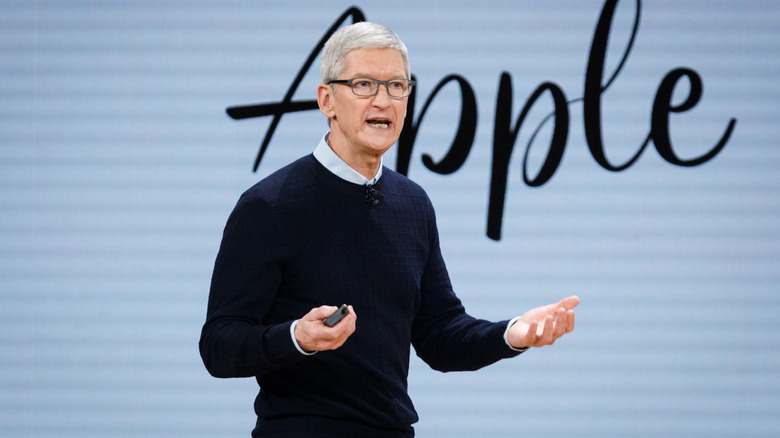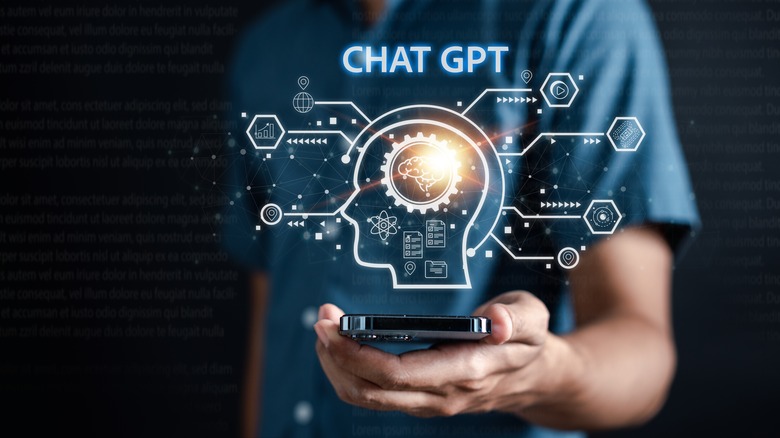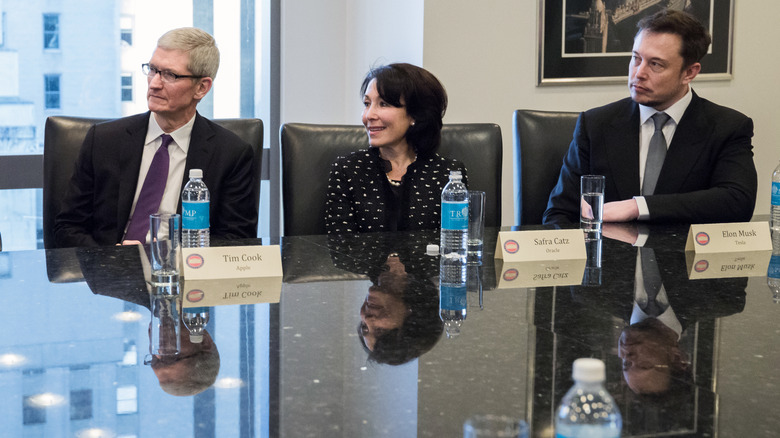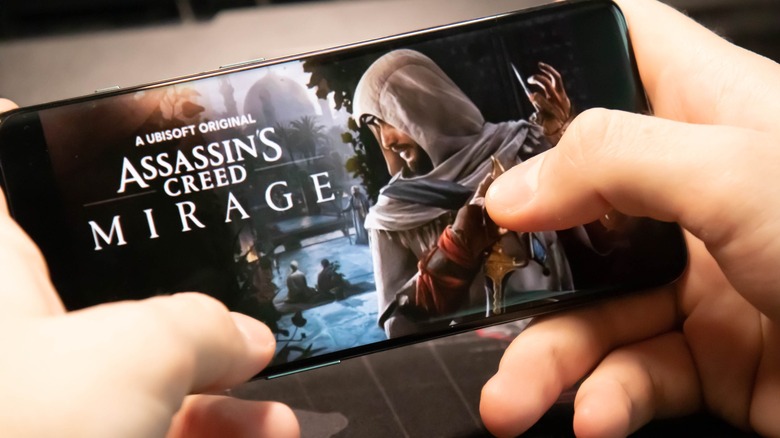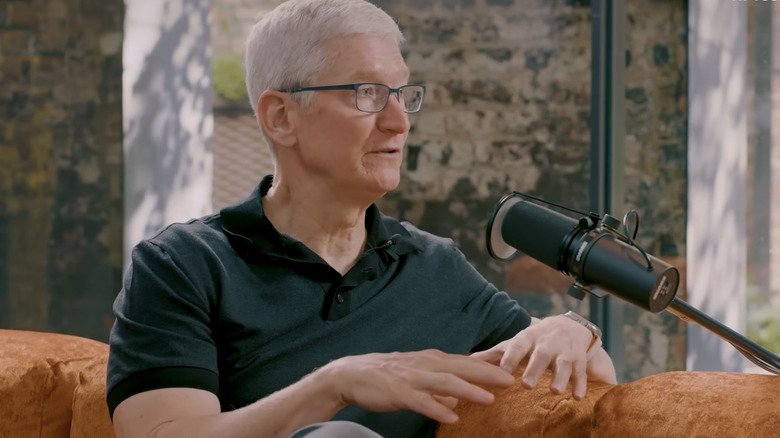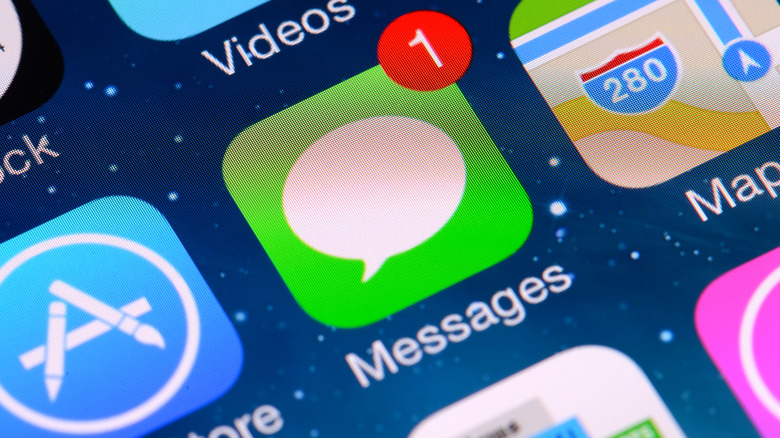Tim Cook's Vision For The Future: Where Is Apple Headed?
When then-COO Tim Cook took over for a dying Steve Jobs as Apple's CEO in August 2011, it was a very different company from the one we know today. Sure, a lot of the same pieces were in place, but more has changed in a dozen years than might be obvious at first glance. The iPad was launched the year prior (2010), as was the Magic Trackpad. The iPhone had only been available on Verizon for a few months and had yet to be made available for Sprint (a few months away) or T-Mobile (over a year and a half away). The iPhone, Apple TV, and MacBook Air lines were each just a few years old. Apple had become successful in ways never previously thought possible, but a lot of the keys to that level of success were pretty new.
The first few years under Cook saw largely iterative product updates, but that changed in the spring of 2014 with the $3 billion purchase of the Beats headphone brand and eventually the launch of both the Apple Watch (huge success) and 12-inch Retina Display MacBook (not so much) a year later. AirPods wireless earbuds followed in December 2016, followed by the mid-priced iPhone SE in March 2017, the HomePod smart speaker in February 2018, the Apple Card credit card in August 2019, AirTag trackers in April 2021, and the start of the shift to Apple Silicon in all of its desktop and notebook computers in November 2020. And along the way, we got a bunch of Apple services, from Apple TV+ to Apple Arcade.
Apple's diversifying. So, based on what Cook has said in interviews and the like, what do we think is next?
Responsible use of generative AI
Since OpenAI's November 2022 public launch of ChatGPT, generative AI has become the new hot thing in the tech world, albeit with a lot of potential ethical complications. There are concerns about such AI stealing from the data it was trained on, as well as AI being used to replace actual human workers. Apple hasn't released any generative AI products as of yet, but in interviews and on investor calls, Tim Cook has made it clear that the company has been working on such tech for a while. He's specified, though, that he wants to make sure that Apple's generative AI tech is used responsibly.
"In terms of generative AI, obviously, we have work going on," Cook explained on Apple's November 2023 investor call. "I'm not going to get into details about what it is because, as you know, we really don't do that. But you can bet that we're investing. We're investing quite a bit. We're going to do it responsibly, and it will... you will see product advancements over time where those technologies are at the heart of them."
Bloomberg had previously reported in July 2023 that Apple was working on a language model, "Ajax," with an associated chatbot nicknamed "Apple GPT." In October 2023, one source dubbed "a person with knowledge of the matter" told Bloomberg that "[t]here's a lot of anxiety about this, and it's considered a pretty big miss internally." The same article said that head of services Eddie Cue was running a team that was looking into how generative AI could be used to assist writers in Pages and Keynote.
Something is coming; the question is what it could be that could compete with rival models while also being more "responsible" than them.
Drawing a line in the sand
Though not a product-related matter, this is still a big deal. In November 2023, Axios reported that Apple had "pause[d]" its advertising campaigns on X, the social media platform formerly known as Twitter, which the article characterized as "follow[ing X owner Elon] Musk's endorsement of antisemitic conspiracy theories as well as Apple ads reportedly being placed alongside far-right content." (Specifically, Musk replied "You have said the actual truth" to someone who answered a challenge to argue why "Hitler was right" by saying that "Jewish communities [sic]" were "pushing...dialectical hatred against whites.")
A couple of months earlier, in September, Cook sat with John Dickerson for an interview on "CBS News Sunday Morning" that, with hindsight, seems somewhat prescient. "It's something that we ask ourselves," Cook replied when asked by Dickerson if Apple should continue to buy ads on X/Twitter. "Generally, my view is Twitter's an important property. I like the concept that it's there for discourse and there as a town square. There [are] also some things about it I don't like!"
"There's discourse, and then there's antisemitism," Dickerson said, to which Cook added: "Yeah, which is abhorrent. Just point blank; there is no place for it." Asked by Dickerson if the Twitter ad spending was "something you're constantly evaluating," Cook answered in the affirmative. "It's something we constantly ask ourselves," he said.
As mainstream political speech becomes more extreme, reactionary, and poisoned by the kind of bigoted rhetoric that led to Apple pulling its ads from X, the more likely it is that Apple will have to make similar decisions in the future. This could even extend to X's App Store presence, particularly since X reinstated a user who was banned for posting child sexual abuse material in July 2023.
Augmented reality and virtual reality
In April 2023, GQ published a sprawling profile of Cook, where he was interviewed extensively. When it came to future products, the topic where he perked up the most was the field of augmented reality and virtual reality. "It could empower people to achieve things they couldn't achieve before," he said. "We might be able to collaborate on something much easier if we were sitting here brainstorming about it and, all of a sudden, we could pull up something digitally and both see it and begin to collaborate on it and create with it. [...] And so this is exciting. If it could accelerate creativity if it could just help you do things that you do all day long and you didn't really think about doing them in a different way."
In other words? Apple's approach to VR should be expected to be about ways to use it as a productivity tool much more than gaming hardware. And though, as noted by GQ, Cook had told The New Yorker in 2015 that he felt that AR/VR glasses "were intrusive," he had seemingly changed his mind, as several weeks after the GQ piece dropped, the Apple Vision Pro headset was announced. Dropping in early 2024, it will be among Apple's priciest products at $3,499 retail, but it fits exactly what Cook described to GQ: A melding of VR and AR technologies with productivity and creativity as the main goal, although its personal home theater capabilities have been stressed, as well.
Though the price will be a hurdle for many, it's so different from all previous Apple hardware that it represents a new frontier for the company. But we'll probably have a better idea of its impact after it's been out for a while.
A bigger push into gaming
When Apple announced the iPhone 15 series in September 2023, a big part of the presentation was touting the new GPU in the A17 Pro system on a chip that powers the iPhone 15 Pro and iPhone 15 Pro Max, which would soon clock a GeekBench score 19.3% better than its predecessor. In particular, to highlight the improved gaming performance on the new phones, Apple announced that the new phones would be getting ports of three current and recent-ish console games: "Resident Evil Village," "Assassin's Creed Mirage," "Death Stranding," and the 2023 remake of "Resident Evil 4." This could allow Apple to carve out new territory in the gaming market.
Tim Cook is clearly cognizant of this new opportunity for Apple, as he showed in an interview with Forbes a couple of weeks after the iPhone 15 event. "I think there's significant excitement both in terms of A17 Pro and M3 on the Mac, about our role in gaming, and we're very serious about it — this is not a hobby for us," he said. "It's something we're putting all of ourselves out there on. iOS is the best gaming platform that's out there, and we want to keep it the best and just keep taking it to the next level. And our silicon road map really is in a camp by itself, we think."
That Apple keeps improving on its homemade CPUs and GPUs each year now is not really up for debate. The question is what Apple can do to better harness the gaming market. An official gamepad shell for iPhones? Ways to play iOS games on TVs without the latency issues introduced by AirPlay mirroring? The opportunity is there, but Apple needs to grab it.
Focusing on sustainability and fair trade
A theme of Apple's product reveal presentations in recent years is the steps it's taken to make its products more sustainable. This includes everything, from no longer bundling chargers and earbuds with iPhones to reduce e-waste and cut emissions by fitting more iPhones into a single shipment to the increasing push to use recycled metals and minerals whenever possible. There's another side to that, though. When recycled metals aren't available, make sure that the new metals were mined ethically, which singer/songwriter Dua Lipa pressed Cook on in a November 2023 podcast interview.
"Yes, we can," he replied when she asked if he could guarantee that the cobalt in the iPhone 15 wasn't mined using child labor in the Democratic Republic of the Congo, the country that produces roughly 70% of the world's cobalt supply. "This is a big idea of not having to mine anything, is to use all recycled material, and today we're using 100% recycled cobalt in the watch and 100% recycled gold, tin, tungsten, and other rare-earth materials in the watch. [...] But for those products that we still do mine, for some of our other products, we have an intense level of tracing in our supply chain all the way back to the mine and the smelter to make sure that the labor used is not child labor. I think we do a really good job of that."
Apple stopped sourcing cobalt from Congo in 2017 over child labor concerns and regularly updates a "Smelter and Refiner List" that, as of its last update on December 31, 2022, did not include Congolese sources. Earning more trust would most likely require allowing independent human rights groups to vet the Apple supply chain, so hopefully, that's next.
Probably not expanding iMessage to Android
Since 2011, Apple devices have, in the Messages app, included the instant messaging service iMessage. In practice, what this means is that iPhones tend to distinguish between other iPhone users — where Messages defaults to iMessage, shows your friends' messages as blue bubbles, and uses your data like WhatsApp and the like do — and all other phones, where SMS is the protocol used and your friends' messages are green bubbles. Besides the social caste side effects of the green bubbles, this creates a system where there's more friction with Android users, like sending a video and not realizing your Android friend will get it as an overly compressed glob of pixels in the 3GP format.
Apple and Android app developers like Beeper are involved in a cat-and-mouse to bridge the gap to iMessage with some crude hacks. And though Apple will be adding RCS functionality — an open standard embraced by Google — to the iPhone messages app to help bridge that gap, Tim Cook has made it very clear that this won't extend to offering iMessage on Android.
"I don't hear our users asking that we put a lot of energy in on that at this point," Cook explained when asked by an audience member about using RCS to link iMessage and Android phones at the September 2022 Code Conference. "I would love to convert you to iPhone!" he added through laughter, only for the audience member to mention the video-sharing issue. "Buy your mom an iPhone," Cook replied through more laughter.
In other words? RCS will probably make the experience better across platforms, but you shouldn't expect anything as frictionless as iMessage for Android from Tim Cook's Apple.
